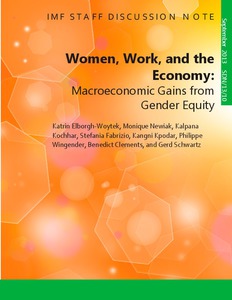Women, work, and the economy: macroeconomic gains from gender equity
“Women make up a little over half the world’s population, but their contribution to measured economic activity, growth, and well-being is far below its potential, with serious macroeconomic consequences. Despite significant progress in recent decades, labor markets across the world remain divided al...
| Main Authors: | , , , , , , , |
|---|---|
| Institution: | ETUI-European Trade Union Institute |
| Format: | TEXT |
| Language: | English |
| Published: |
Washington, DC
2013
IMF |
| Subjects: | |
| Online Access: | https://www.labourline.org/KENTIKA-19121916124919491989-Women,-work,-and-the-economy-m.htm |
| _version_ | 1771659900719464448 |
|---|---|
| author | Elborgh-Woytek, Katrin Newiak, Monique Kochhar, Kalpana Fabrizio, Stefania Kpodar, Kangni Wingender, Philippe Clements, Benedict Schwartz, Gerd |
| author_facet | Elborgh-Woytek, Katrin Newiak, Monique Kochhar, Kalpana Fabrizio, Stefania Kpodar, Kangni Wingender, Philippe Clements, Benedict Schwartz, Gerd |
| collection | Library items |
| description | “Women make up a little over half the world’s population, but their contribution to measured economic activity, growth, and well-being is far below its potential, with serious macroeconomic consequences. Despite significant progress in recent decades, labor markets across the world remain divided along gender lines, and progress toward gender equality seems to have stalled. Female labor force participation (FLFP) has remained lower than male participation, women account for most unpaid work, and when women are employed in paid work, they are overrepresented in the informal sector and among the poor. They also face significant wage differentials vis-à-vis their male colleagues. In many countries, distortions and discrimination in the labor market restrict women’s options for paid work, and female representation in senior positions and entrepreneurship remains low.
The challenges of growth, job creation, and inclusion are closely intertwined. While growth and stability are necessary to give women the opportunities they need, women’s participation in the labor market is also a part of the growth and stability equation. In particular, in rapidly aging economies, higher female labor force participation can boost growth by mitigating the impact of a shrinking workforce. Better opportunities for women can also contribute to broader economic development in developing economies, for instance through higher levels of school enrollment for girls. This Staff Discussion Note examines the specific macro-critical features of women’s participation in the labor market, the constraints preventing women from developing their full economic potential, and possible policies to overcome these obstacles. Implementing policies that remove labor market distortions and create a level playing field for all will give women the opportunity to develop their potential and to participate in economic life more visibly. The analysis presented in this Staff Discussion Note is based on research undertaken in academia and by other international financial institutions, in addition to the IMF’s own surveillance and research work.” |
| format | TEXT |
| id | 19121916124919491989_4b8630fcc8574bb08ce07605e8782c0e |
| institution | ETUI-European Trade Union Institute |
| is_hierarchy_id | 19121916124919491989_4b8630fcc8574bb08ce07605e8782c0e |
| is_hierarchy_title | Women, work, and the economy: macroeconomic gains from gender equity |
| language | English |
| physical | 32 p. Digital |
| publishDate | 2013 |
| publisher | Washington, DC IMF |
| spellingShingle | Elborgh-Woytek, Katrin Newiak, Monique Kochhar, Kalpana Fabrizio, Stefania Kpodar, Kangni Wingender, Philippe Clements, Benedict Schwartz, Gerd family benefit female occupation labour force participation labour market retired worker women workers women gender equality gender roles Women, work, and the economy: macroeconomic gains from gender equity |
| thumbnail | https://www.labourline.org/Image_prev.jpg?Archive=109659192783 |
| title | Women, work, and the economy: macroeconomic gains from gender equity |
| topic | family benefit female occupation labour force participation labour market retired worker women workers women gender equality gender roles |
| url | https://www.labourline.org/KENTIKA-19121916124919491989-Women,-work,-and-the-economy-m.htm |

